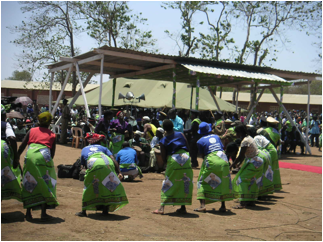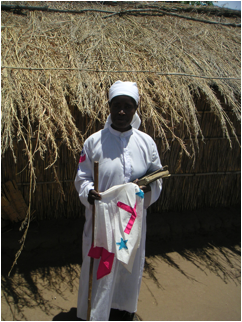Ph.D. University of Münster, Germany (2008)
M.A. University of Münster, Germany (2001)
Dr. Steinforth’s research & writing focuses on the anthropology of politics, religion, and medicine; mental health, transcultural psychiatry; (dis)ability, configurations of the normal, and personhood; discourse, authorship, and representation; multiple modernities; power, authority, and legitimacy; cosmologies and the occult; colonialism and neo-colonialism; Southern and Eastern Africa; Central Europe
Research
 Conducted within the academic context of the University of Münster’s Cluster of Excellence Religion and Politics in Pre-Modern and Modern Cultures between 2009 and 2013, my most recent research focuses on the cosmologies of politics and social organization. Field research in Malawi, a country in South-Eastern Africa, provides the setting for this project that addresses classical modernization theory’s secularization paradigm as well as the implications of a functional differentiation between religious and political spheres of human life. Power, authority, and legitimacy are the relevant keywords that need to be carefully (re-) defined within their specific ethnographic setting in order to facilitate analysing local phenomena and processes. Investigating political cosmologies in African societies should not be misunderstood as enforcing the alleged structural difference between “the West and the rest” but should rather serve to disentangle these ideological constructions by questioning the secular rationality of European and North American societies in turn. Conducted within the academic context of the University of Münster’s Cluster of Excellence Religion and Politics in Pre-Modern and Modern Cultures between 2009 and 2013, my most recent research focuses on the cosmologies of politics and social organization. Field research in Malawi, a country in South-Eastern Africa, provides the setting for this project that addresses classical modernization theory’s secularization paradigm as well as the implications of a functional differentiation between religious and political spheres of human life. Power, authority, and legitimacy are the relevant keywords that need to be carefully (re-) defined within their specific ethnographic setting in order to facilitate analysing local phenomena and processes. Investigating political cosmologies in African societies should not be misunderstood as enforcing the alleged structural difference between “the West and the rest” but should rather serve to disentangle these ideological constructions by questioning the secular rationality of European and North American societies in turn.
Previously, my previous research has been dedicated to investigating local conceptualizations of health (including mental illness and disability), giving special attention to the cosmological embeddedness of diverging discourses of illness as well as to the larger social processes of transformation they are connected to. Within the context of Transcultural Psychiatry, these avenues of inquiry lead to fundamental anthropological questions concerning specific definitions of a normal vs. pathological condition of the human person, its relationship to concepts such as spirit ancestors or witchcraft, and the ways in which care and treatment reflect these notions within any given social setting. One of the most fascinating aspects of this line of research is the remarkable tolerance of ambiguity that local actors display when accessing different kinds of health services – and thereby different philosophical models of human health.

Selected Publications:
In progress. Prophets and Presidents: Authority and Cosmology in an African Society.
In review. Madness, Mental Health, Modernity: Psychiatry’s Competition with Religion (ed. with Helene Basu and Roland Littlewood).
Forthcoming. Between Shrine and Courtroom: Legal Pluralism, Witchcraft, and Spirit Agency in South-Eastern Africa. In Law of Possession: Ritual, Healing, and the Secular State. Helene Basu and William Sax, eds. Pp-pp. New York, NY: Oxford University Press.
2013. Spirits in Politics: Uncertainties of Power and Healing in African Societies. Frankfurt: Campus (ed. with Barbara Meier).
2013. Power and Healing in African Politics: An Introduction. In Spirits in Politics: Uncertainties of Power and Healing in African Societies. Barbara Meier and Arne S. Steinforth, eds. Pp. 15-36. Frankfurt: Campus (with Barbara Meier and Victor Igreja).
2013. The Spirit in the Voting Booth: Democracy and Cosmology in Malawi. In Spirits in Politics: Uncertainties of Power and Healing in African Societies. Barbara Meier and Arne S. Steinforth, eds. Pp. 135-155. Frankfurt: Campus.
2012. Social Anthropology and Transcultural Psychiatry. Curare 35 (1+2): 17-28 (with Helene Basu and Nina Grube).
2011. The Solid and the Liquid: Identifying Institutions and Fields of Healing. Curare 34 (3): 193-200.
2009. Troubled Minds: On the Cultural Construction of Mental Disorder and Normality in Southern Malawi. Frankfurt: Peter Lang.
2009. Whose Madness? Diverging Manifestations of Mental Illness in Dialogue. Curare 32 (1+2): 96-105.
|





